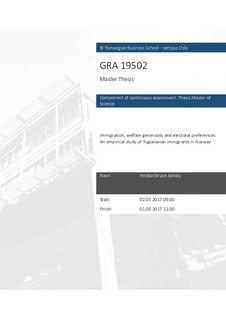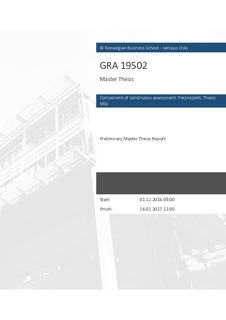| dc.contributor.author | Jarlsby, Hedda Struve | |
| dc.date.accessioned | 2018-02-22T09:57:49Z | |
| dc.date.available | 2018-02-22T09:57:49Z | |
| dc.date.issued | 2017 | |
| dc.identifier.uri | http://hdl.handle.net/11250/2486354 | |
| dc.description | Masteroppgave(MSc) in Master of Science in Business, Economics - Handelshøyskolen BI, 2017 | nb_NO |
| dc.description.abstract | Does immigration reduce natives’ support for the welfare state? Immigration is
a growing source of ethnic heterogeneity, which is said to change individual
attitudes towards redistributive public spending. This paper exploits municipallevel
variations in Yugoslavian immigrants to estimate the causal effects on
welfare generosity and electoral preferences in Norway (1990-2003). The
analysis is performed by using fixed effect regression models on a balanced
panel data of 394 municipalities. The results indicate that a higher share of
Yugoslavians in Norway is associated with higher welfare generosity and lower
vote share for left-wing parties. In contrast to previous studies, there is little
indication of a cost constraint from higher welfare use or a negative shift in
native’s preference for redistribution from a higher share of Yugoslavians. The
observed positive effect on welfare generosity does not seem to be driven by the
political arena as support for left-wing parties and more redistribution is
estimated to reduce, but rather from higher welfare spending in municipalities
where welfare needs are high. Ultimately, the study give insight on how
relatively high-skilled immigrants affect welfare support through redistributive
spending and voting attitudes. | nb_NO |
| dc.language.iso | eng | nb_NO |
| dc.publisher | BI Norwegian Business School | nb_NO |
| dc.subject | samfunnsøkonomi | nb_NO |
| dc.subject | economics | nb_NO |
| dc.title | Immigration, welfare generosity and electoral preferences: an empirical study of Yugoslavian immigrants in Norway | nb_NO |
| dc.type | Master thesis | nb_NO |

